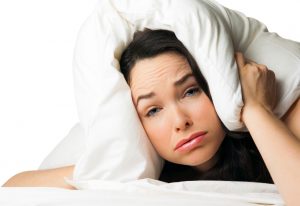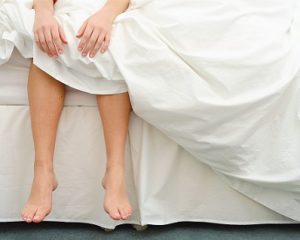
Multiple Chemical Sensitivity & Improving Sleep Quality
If your Multiple Chemical Sensitivity Syndrome includes sensitivities to foods, or rather the chemicals in which foods are composed of, then what you eat may be having serious repercussions on your quality of sleep. One thing I noticed that dramatically changed as my chemical sensitivities increased was the vividness of my dreams, the length of my dreams, and my ability to recall my dreams increased as well.
 Because of the vividity of my dreams I would be pulled more into my dream world in a manner in which lead to waking up feeling more and more exhausted. It felt like I had been up all night living one life only to wake up in another just beginning. There was no “sleep” or “rest,” just hopping from one life to the next.
Because of the vividity of my dreams I would be pulled more into my dream world in a manner in which lead to waking up feeling more and more exhausted. It felt like I had been up all night living one life only to wake up in another just beginning. There was no “sleep” or “rest,” just hopping from one life to the next.
When we dream, our bodies change in a number of ways, sleep paralysis is induced to prevent us from acting out our dreams in the real world, but I would thrash, kick, talk, yell, and grind my teeth in my sleep.
 There’s also a lot of chemical changes in the body that do things like make it so you don’t have to use the bathroom in the middle of the night. Instead, I go anywhere from 3 to 7 times per night. Because everything is sensitive, even the littlest bit of urine in my bladder yields pain, so this pain wakes me up.
There’s also a lot of chemical changes in the body that do things like make it so you don’t have to use the bathroom in the middle of the night. Instead, I go anywhere from 3 to 7 times per night. Because everything is sensitive, even the littlest bit of urine in my bladder yields pain, so this pain wakes me up.
If I don’t wake up, I spends hours in dreamland searching for a bathroom, only to find overflowing or totally rancid toilets abound.
Nightmares are a huge part of Central Sensitivity Syndromes, as the mind cannot make sense — consciously, subconsciously, and unconsciously – of the pain and exhaustion, so your mind makes up stories to make sense of it all in your dreams.
 It’s typically an assault of some kind by some unseen force, since these are invisible conditions.
It’s typically an assault of some kind by some unseen force, since these are invisible conditions.
From a shooter out of view riddling my body with bullets, to demonic presences in haunted houses, my mind fabricates wild stories to try and identify and understand the source of the pain.
I may be chased in my dreams, or I may end up witnessing the aftermath of war or some other extensively exhausting event.
The key here isn’t psych 101 for dream interpretation. The message is clear, my unconscious mind is just as confused as my conscious mind is about what makes me feel this way. Rather, the key here is to reduce the vividity of the dreams, the ability to recall the dreams, and to shorten the length of those dreams.
One way I found to do this was 25mg of Flexeril at bedtime. It dulls my dreams so I very rarely remember them. However, I still had vivid restless dreams, I just didn’t recall having them. So, while this was a wonderful find at the time, it also prevented me from identifying what was actually causing my dreams to be like this is the first place. It took me years to figure out what it was, and it may not be the only culprit, but the protocol that developed after the finding eliminates any additional culprits.
 The thing is, there are a number of minerals and vitamins and additives, preservative, etc. that can effect sleep when ingested. The top culprits are caffeine and Vitamin B7, also known as Biotin, which is well known to increase the vividness of dreams.
The thing is, there are a number of minerals and vitamins and additives, preservative, etc. that can effect sleep when ingested. The top culprits are caffeine and Vitamin B7, also known as Biotin, which is well known to increase the vividness of dreams.
However, this is typically with higher concentrations, but with chemical sensitivities, you only need a little. While eating foods rich in biotin in the morning is fine, eating them mid-day or at night, not so good.
In fact, eating anything after 8pm is not recommended. There are so many things in foods that are normally good for you, but will wreak havoc on your quality of sleep if eaten to close to bedtime.
Keep in mind, that while you may stop eating at 8pm, you’re still digesting that food up to 4 hours later, still releasing the chemical compounds of that food into your blood stream and brain. So, ideally, if you want the best sleep possible, stop eating approximately 4 HOURS OR MORE before you typically either head to bed, or generally fall asleep.
Also, since these chemical compositions will still remain in the body after digestion, it’s a good rule of thumb to avoid biotin rich foods after noon. This allows your body plenty of time to get it out of your system. Biotin and caffeine are immediate energy sources, so they perk you up, the last thing you want to eat when you have sleep problems, but great sources of energy earlier in the day. Since the energy is ready to use right away, you will get it out of your system faster than some things, but if you’re primarily sedentary lie me, using energy takes quite a bit longer than most people.
So, test the waters. Move biotin and caffeine rich foods into the mornings, foods with average or little biotin in the afternoon, and stop eating at least 4 hours before bed. Try this for a week and see how you feel. You may notice little changes in as soon as the first day.
 Note: This means only consuming water during the 4 hours before bedtime. Nothing else, absolutely nothing else except medications that you absolutely need (do not ingest anything else but water – no flavoring either). In fact, I recommend not taking any supplements during this time that you normally take at night. You need to find your baseline, how you feel and what your dreams are like void of all this STUFF. Then, if all goes well, you can reintroduce the supplements slowly, one by one overtime if you still need them.
Note: This means only consuming water during the 4 hours before bedtime. Nothing else, absolutely nothing else except medications that you absolutely need (do not ingest anything else but water – no flavoring either). In fact, I recommend not taking any supplements during this time that you normally take at night. You need to find your baseline, how you feel and what your dreams are like void of all this STUFF. Then, if all goes well, you can reintroduce the supplements slowly, one by one overtime if you still need them.

